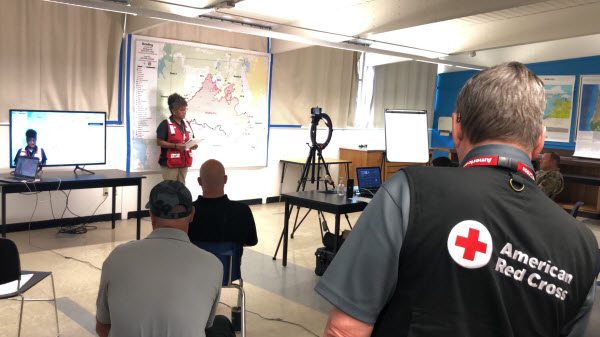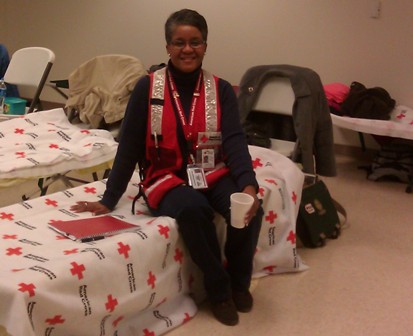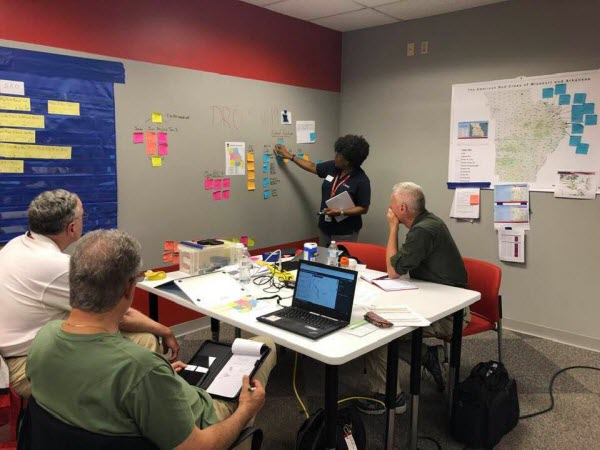


By Jennifer Costa, Regional Communications Director
“Every day on my way to work I drove through swarms of insects called midges. They sounded like raindrops hitting my car. Quite frankly it creeped me out.”
Red Cross volunteer, Phyllis Rand, is no stranger to adapting to challenging situations. The Lewiston woman is part of her Central and Mid Coast Maine Chapter leadership team and has deployed to 12 national disaster relief operations during her tenure with the Red Cross.
“The absolute most important thing is to be flexible,” she says, adding that when things don’t go exactly as planned, “Always remember why you joined the Red Cross. It serves as a reset button.”
Rand recently returned from a two-week deployment to Oregon’s Bootleg Fire where she served as the Government Operations Liaison at two incident command posts in Chiloquin and Klamath Falls. There she briefed first responders and partner government agencies on daily Red Cross activities.
“It’s more of a behind-the-scenes role and that’s one of the things I really like about it,” says Rand. “I like working behind-the-scenes to make the machine run.”
The Bootleg wildfire started on July 6, merging with the Log Fire about a week later. To date, it’s charred more than 413,000 acres and is not expected to be contained until early October. This wildfire season has gotten off to an early and dramatic start with 108 large fires burning across 15 states. The Red Cross is actively helping hundreds of people who have been evacuated from their homes in Oregon, California, Nevada and Montana.
“I’ve never considered deploying a sacrifice. It’s never occurred to me,” says Rand. “National deployments can give you an experience, such working on a wildfire disaster relief operation, that you would not necessarily have at home.”
For more than a decade, Rand has repeatedly left behind family, friends, her full-time job and the comforts of home at a moment’s notice to help those affected by Hurricanes Matthew, Irma and Sandy, flooding in Missouri and Illinois and wildfires in California and Oregon. She says each mission serves as an opportunity for personal and professional growth.
“I learned that the clean-up kits that we hand out for floods, for example, are different than those we hand out for wildfires. You gain that additional level of knowledge and experience as a Red Crosser that makes you a better responder,” says Rand.
It’s also helped out at work. She’s a Water Quality Coordinator for a local utility. Rand says she feels fortunate to have an employer who recognizes the value in her relief efforts.
“I’ve learned how to develop emergency plans – and how to exercise those plans,” she says, “What my general manager realized is that the skills I have been learning through my deployments with the Red Cross are skills that I can bring back to my job.”
Deploying to hard hit, disaster-ravaged regions can be fulfilling work, but it can also take an emotional toll. Rand still remembers her first time. It was 2011 – the year of the Super Outbreak, the largest tornado outbreak in U.S. history. Rand was sent to an area in northern Alabama where several people were hurt – and one person died after nine tornados ripped through the community.
“I remember at one point I was driving by these foundations where houses used to be. There was pink insulation in the trees and metal fences. I had to pull over. I just started crying and feeling hopeless,” she says. “I was about to get back in my car and I was staring off down the road. It was kind of foggy. I know that it sounds like a movie, but out of the fog I saw one of our Red Cross Emergency Response Vehicles. I don’t know where they were going, but in that moment, I thought: Wow, this is why we are here. And it just changed me because I knew that I was part of that.”
With weather experts predicting an especially active disaster season, the Red Cross of Northern New England currently has a critical need for shelter volunteers, health professionals and disaster responders. The Red Cross provides the free training to help you succeed. And veteran volunteers, like Rand, are on hand for support, encouragement and guidance.
“Many of us who have deployed have tips and tricks and things that have worked for us,” says Rand. “You are not alone. Even though you may not know us personally, we all wear that Red Cross vest, and we are here to help each other.”
For more information, contact our Volunteer Recruitment Team of Northern New England at 207-523-5107 or email VolunteerNNE@redcross.org.